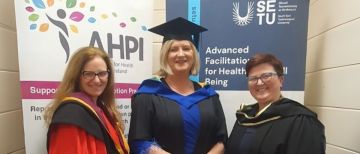Graduate of SETU’s MA in Advanced Facilitation Skills for Health and Well-Being, Shelagh Murphy, discusses the benefits of lifelong learning.

Before working with Tipperary ETB Adult Literacy Service for over 20 years, Shelagh had worked previously in the food and travel industry.
“Through initially volunteering and then working as a literacy tutor, I found work that was both rewarding and interesting,” Shelagh said.
Shelagh had previously studied a Bachelor of Arts in University College Cork in 1985, and a postgraduate diploma in Adult Education in 2001.
Taking the leap back to education, Shelagh said: “I was motivated to study the MA in Advanced Facilitation Skills for Health and Well-Being at SETU to learn and develop personally and professionally. I believe strongly in lifelong learning and how it benefits adults.”
Builds confidence
Studying the programme at SETU has had great impact on Shelagh’s confidence in her role. “I returned to work as an Adult Literacy Tutor with additional group work skills, confidence, and continued interest in lifelong learning and research,” she said.
Personal development
“The modules within the course that I found most beneficial were the personal development modules. They were supportive, challenging and provided critical thinking skills which helped my personal growth,” explained Shelagh.
Facilitation for Health
Shelagh also enjoyed the modules in facilitation skills: “These were theoretical, experiential, skill-based and relevant for working in a wide range of health, well-being and psycho-educational settings”. She appreciated the integration of theory across the various streams: “The health and well-being modules were relevant and provided academic and evidence-based material that interlinked across the other modules on the programme.”
Advice for prospective students
Shelagh gave her advice for those considering the programme: “Embrace the opportunity this course offers for personal, professional and academic development.
Course delivery
“The content and course structure are relevant and well delivered with a mix of in-person and online material, spread across three semesters with the summer months off, which all helps work/life balance.” Shelagh concluded.



